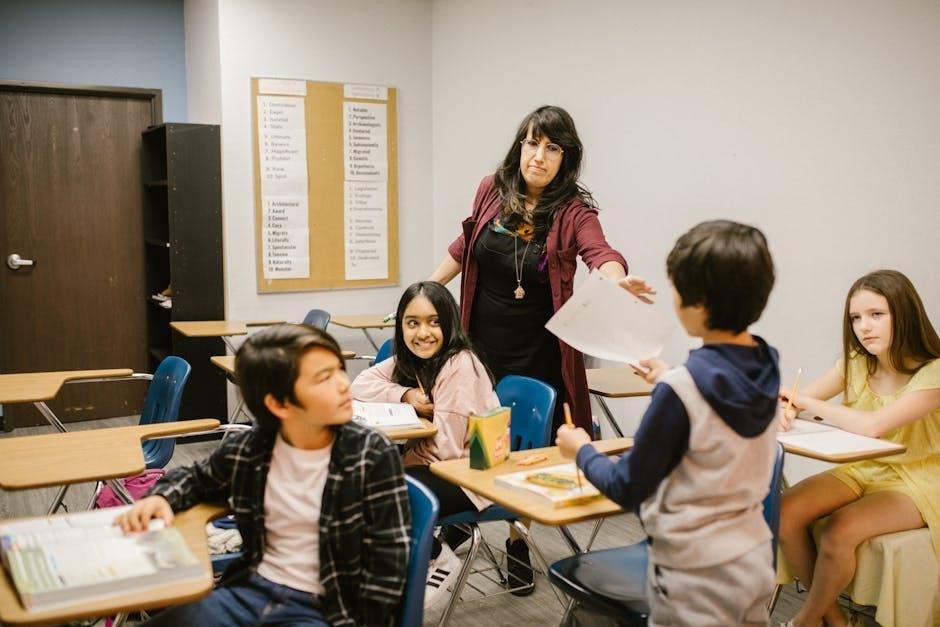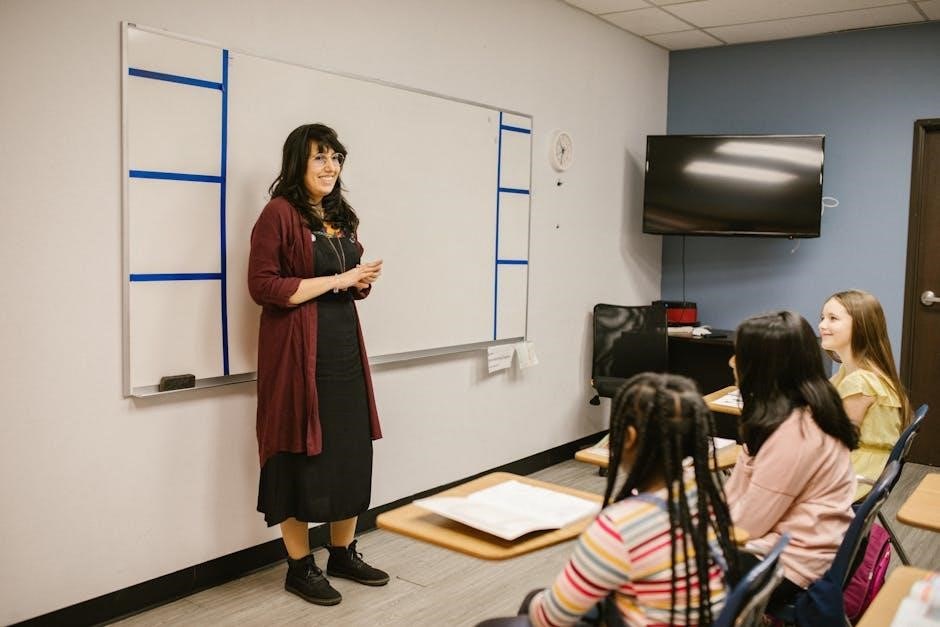School counselor interviews are crucial for assessing candidates’ suitability for the role. They evaluate expertise‚ empathy‚ and commitment to student well-being. Preparation is key to standing out.
1.1 Understanding the Role of a School Counselor
A school counselor plays a vital role in supporting students’ academic‚ social‚ and emotional growth. They collaborate with teachers‚ administrators‚ and parents to create a conducive learning environment. Key responsibilities include providing individual and group counseling‚ developing school counseling programs‚ and addressing students’ needs through data-driven practices. Effective school counselors are empathetic‚ strong communicators‚ and adept at conflict resolution. Understanding this role is essential for candidates to align their skills and experiences with the expectations of the position during interviews.
1.2 Importance of Preparation for a School Counselor Interview
Preparation is crucial for a school counselor interview‚ as it demonstrates initiative and readiness to contribute effectively. Researching the school’s mission‚ understanding its specific needs‚ and practicing answers to common questions can significantly enhance confidence. Reviewing potential scenarios and behavioral questions helps showcase problem-solving skills and counseling expertise. Additionally‚ aligning personal philosophies with the school’s values highlights a candidate’s suitability. Preparation not only ensures a polished presentation but also underscores a genuine interest in the role and the school community‚ making a lasting impression on interviewers.

Common School Counselor Interview Questions
School counselor interviews often include questions about background‚ motivation‚ and scenario-based challenges. These questions assess a candidate’s counseling skills‚ problem-solving abilities‚ and alignment with the school’s values.
2.1 General Questions About Background and Motivation
Interviewers often ask about your educational background‚ professional experience‚ and motivation for becoming a school counselor. Questions like‚ “What inspired you to pursue this career?” or “How does your background prepare you for this role?” are common. These questions help assess your passion for the field and alignment with the school’s mission. Be prepared to share specific examples from your experience and clearly articulate your commitment to student well-being and academic success. Demonstrating genuine enthusiasm and a clear vision for your role is essential.
2.2 Scenario-Based Questions for School Counselors
Scenario-based questions assess how you handle real-life situations‚ such as addressing bullying or helping a struggling student. Questions like‚ “How would you support a student with academic difficulties?” or “Describe a strategy for resolving a conflict between students.” These questions evaluate your problem-solving skills‚ empathy‚ and ability to apply counseling techniques. Provide clear‚ concise answers that demonstrate your approach and commitment to student well-being. Be specific and highlight your experience in navigating similar challenges effectively.
2.3 Behavioral Questions to Assess Counseling Skills
Behavioral questions evaluate your past experiences and how you applied counseling skills. Examples include‚ “Describe a time you helped a student with behavioral issues” or “How did you handle a difficult parent-teacher conference?” These questions assess your problem-solving‚ communication‚ and interpersonal skills. Be prepared to provide specific examples using the STAR method (Situation‚ Task‚ Action‚ Result) to demonstrate your effectiveness in real-world scenarios. Highlight how your actions positively impacted students and stakeholders.
How to Prepare for a School Counselor Interview
Preparation involves researching the school‚ practicing answers to common questions‚ and understanding the school’s mission. Reviewing the role and aligning your skills with their needs is essential.
3.1 Researching the School and Its Needs
Researching the school involves understanding its mission‚ student demographics‚ and specific challenges. Reviewing the school’s website‚ recent news‚ and academic programs provides insights into their priorities. Identifying the school’s goals helps align your skills and experiences with their needs. Understanding the student body’s diversity and any unique programs or initiatives ensures you can address how you would contribute effectively. This preparation demonstrates your commitment and readiness to support the school’s community‚ making you a stronger candidate during the interview.
3.2 Practicing Answers to Common Questions
Practicing answers to common school counselor interview questions is essential for confidence and clarity. Review potential questions‚ such as those about collaboration with teachers or student support strategies. Use the STAR method (Situation‚ Task‚ Action‚ Result) to structure responses. Consider recording yourself or seeking feedback from mentors. Familiarize yourself with scenario-based and behavioral questions to articulate your problem-solving skills. This preparation ensures you can highlight your qualifications and alignment with the school’s values effectively during the interview.
3.3 Understanding the School’s Mission and Values
Understanding the school’s mission and values is critical for a successful interview. Research the school’s goals‚ such as academic excellence or social-emotional learning. Align your responses with these priorities‚ demonstrating how your philosophy and practices support the school’s objectives. Highlight your ability to foster an inclusive environment and promote student success. This alignment shows your commitment to the school’s community and enhances your candidacy‚ proving you are a thoughtful and dedicated professional ready to contribute meaningfully.

Sample Answers to School Counselor Interview Questions
Sample answers provide insights into effective responses‚ showcasing strategies to address student needs and collaborate with educators. They highlight empathy‚ problem-solving‚ and dedication to student success.
4.1 Answering Questions About Collaboration with Teachers
When asked about collaboration‚ emphasize teamwork and communication. Mention how you’ve worked with teachers to identify student challenges‚ develop strategies‚ and monitor progress. Highlight specific examples‚ like co-developing action plans or sharing resources. Show how your collaborative efforts improved student outcomes‚ demonstrating your ability to work seamlessly within a school team. This approach illustrates your commitment to student success and your understanding of the importance of educator partnerships.
4.2 Responding to Questions About Student Support Strategies
Highlight a multi-faceted approach to student support‚ such as individual counseling‚ group sessions‚ and academic advising. Emphasize collaboration with teachers to identify needs and develop tailored strategies. Mention data-driven practices to track progress and adapt interventions. Discuss how you create a safe‚ inclusive environment‚ fostering emotional and academic growth. Provide examples of how you’ve supported diverse student needs‚ ensuring equity and accessibility. Showcase empathy‚ cultural sensitivity‚ and a commitment to empowering students to thrive academically and personally.
4.3 Providing Examples of Conflict Resolution in Schools
When discussing conflict resolution‚ provide specific examples of how you’ve mediated disputes between students‚ teachers‚ or parents. Highlight your use of active listening‚ empathy‚ and problem-solving techniques. Describe how you fostered open communication and encouraged mutual understanding. Share how you implemented restorative practices to repair relationships and promote a positive school climate. Emphasize collaboration with other staff members to ensure long-term resolutions. Showcase your ability to remain impartial and focus on the well-being of all parties involved.

School Counselor Interview Questions and Answers PDF Guide
A downloadable PDF guide offering comprehensive school counselor interview questions‚ sample answers‚ and expert tips to help candidates prepare effectively for their interviews.
5.1 Benefits of Using a PDF Guide for Preparation
A PDF guide provides a structured approach to interview preparation‚ offering convenience and accessibility. It includes common questions‚ sample answers‚ and tips‚ aiding candidates in organizing their thoughts and practicing responses effectively. The guide serves as a valuable resource for self-study‚ enabling candidates to identify strengths and areas for improvement. By leveraging this tool‚ aspirants can enhance their confidence and readiness‚ ensuring they present themselves as ideal candidates during the interview. This comprehensive format is essential for a polished performance.
5.2 How to Download and Use the PDF Resource Effectively
To maximize the benefits of the PDF guide‚ download it from a reliable source and save it to a easily accessible device. Open the document and review the table of contents to navigate sections efficiently. Focus on practicing answers to common questions and analyzing sample responses to refine your own. Highlight key points and take notes for better retention. Use the guide to simulate mock interviews‚ ensuring you are well-prepared for real scenarios. Regular review will enhance your confidence and readiness for the interview.

Advanced Topics in School Counselor Interviews
Explore data-driven practices‚ technology integration‚ and innovative communication strategies to demonstrate advanced counseling skills and prepare effectively for modern school counselor interviews.
6.1 Discussing Data-Driven Counseling Practices
Data-driven counseling practices involve using student data to inform decisions. This approach ensures interventions are tailored to specific needs‚ enhancing outcomes. Be prepared to discuss how you collect‚ analyze‚ and apply data to improve academic and emotional support for students. Examples might include tracking progress metrics or using assessments to identify at-risk students. Demonstrating how you integrate data into your practice shows a commitment to evidence-based counseling. Highlighting specific tools or methods you use can further illustrate your expertise in this area.
6.2 Addressing Technology Use in Counseling
Technology plays a vital role in modern counseling‚ enhancing accessibility and engagement. Tele-counseling platforms allow remote sessions‚ benefiting students with scheduling or mobility challenges. Digital tools‚ such as online assessments and progress tracking software‚ streamline data collection and analysis. When discussing technology‚ emphasize ethical considerations like privacy and equity. Highlighting your experience with such tools demonstrates adaptability and commitment to innovative student support. Be prepared to share examples of how you’ve effectively integrated technology into your practice while addressing potential challenges like the digital divide.
6.3 Explaining Approaches to Parent-School Communication
Effective parent-school communication is essential for student success. Counselors should foster collaboration through regular updates‚ such as newsletters or online portals‚ ensuring parents are informed about their child’s progress. Organizing parent-teacher meetings and workshops can strengthen involvement. Active listening and empathy are crucial when addressing parental concerns. Leveraging technology‚ like school apps or email‚ enhances accessibility. Building trust through transparency and consistency helps create a supportive environment for students. Highlighting these strategies demonstrates your commitment to fostering a collaborative school community.

Mistakes to Avoid in a School Counselor Interview
Avoid appearing unprepared or lacking knowledge about the school. Not researching the school’s mission or failing to provide specific examples of your counseling strategies can harm your candidacy.
7.1 Common Pitfalls in Answering Behavioral Questions
One common mistake is failing to provide specific examples from past experiences‚ leading to vague answers. Candidates may also overlook researching the school’s mission‚ appearing unprepared. Avoid discussing negative experiences or speaking poorly about previous employers‚ as this reflects unprofessionalism. Additionally‚ not tailoring responses to align with the school’s values can harm credibility. Practicing structured responses using methods like STAR ( Situation‚ Task‚ Action‚ Result) helps avoid these pitfalls‚ ensuring clear‚ concise‚ and relevant answers.
7.2 Overlooking the Importance of School-Specific Questions
Not researching the school’s unique needs and values is a significant oversight. Candidates who ask generic questions may appear unprepared or uninterested. Tailoring questions to the school’s mission‚ student demographics‚ and specific programs demonstrates genuine interest. Avoid assuming all schools are the same; instead‚ highlight how your skills align with their particular goals. Failing to address school-specific challenges‚ such as student support strategies or collaboration with staff‚ can make candidates seem less invested in the role. Always prioritize understanding the school’s unique context.

Follow-Up After the Interview
Follow-up after an interview is crucial for leaving a positive impression. Send a thank-you note or email and address any unanswered questions to show your diligence.
8.1 Writing a Thank-You Note or Email
A thank-you note or email after an interview demonstrates professionalism and gratitude. Express appreciation for the opportunity‚ highlight key points discussed‚ and reiterate your interest in the role. Personalize the message to reflect specific aspects of the interview‚ such as topics discussed or insights gained. Keep the tone professional yet sincere‚ ensuring it is concise and sent within 24 hours of the interview. This gesture leaves a positive impression and reinforces your suitability for the school counselor position.
8.2 How to Address Any Unanswered Questions
If questions remain unanswered during the interview‚ address them professionally in a follow-up email. Politely ask for clarification or provide additional information if needed. This demonstrates initiative and shows you value the opportunity. Include a brief introduction‚ clearly state the unanswered questions‚ and express gratitude for their time. Keep the tone professional and concise‚ ensuring your message is well-structured and respectful. This approach not only clarifies doubts but also reinforces your interest in the role.
Preparation and understanding the role are key to success. Utilize the PDF guide to enhance your readiness and confidently ace your school counselor interview.
9.1 Final Tips for Acing a School Counselor Interview
To excel in your school counselor interview‚ thoroughly research the school’s mission and needs. Practice answering common questions‚ focusing on your experience and alignment with their values. Be prepared to discuss data-driven practices and collaboration with teachers. Highlight your ability to support student well-being and academic success. Use the STAR method for behavioral questions‚ demonstrating clear problem-solving skills. Finally‚ send a thank-you note post-interview to express gratitude and reiterate your enthusiasm for the role.

Additional Resources
Recommended books‚ online courses‚ and PDF guides offer comprehensive preparation. Joining professional networks provides valuable support and insights for aspiring school counselors.
10.1 Recommended Books and Online Courses
Enhance your preparation with books like “The School Counselor Interview Questions and Answers PDF” and online courses on platforms like Coursera or Udemy. These resources provide in-depth insights‚ practical examples‚ and strategies to excel in interviews. They cover topics such as counseling techniques‚ student support strategies‚ and school collaboration. Additionally‚ courses on educational psychology and child development can strengthen your knowledge base. Leveraging these tools will help you develop a comprehensive understanding of the role and improve your confidence during the interview process.
10.2 Joining Professional Networks for Support
Joining professional networks like the American School Counselor Association (ASCA) or local counseling groups provides valuable support and resources. These networks often share interview tips‚ best practices‚ and insights from experienced counselors. Engaging with online forums or LinkedIn groups dedicated to school counseling can also connect you with professionals who offer advice and encouragement. Building these connections not only enhances your preparation but also keeps you informed about industry trends and innovative strategies in counseling.



